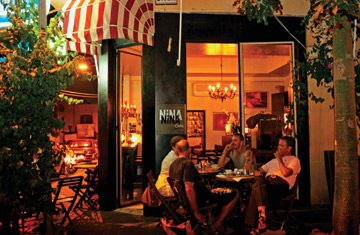
After almost a decade of terror fears and economic woes, Tel Aviv is quietly emerging as the Mediterranean's most unlikely capital of cool. Awash in foreign investment (and foreign travelers), the city's culinary, cultural and clubbing scenes are all reaching world-class status — only without the high-end prices. Add in nearly 6 miles (10 km) of city-center beaches, year-round sunshine and easy access to Israel's popular religious sites, and the Holy Land has never been more happening.
Nowhere better exemplifies Tel Aviv's new groove than the city's oldest quarter, Neve Tzedek, which was founded more than a century ago — a full two decades before Tel Aviv itself. This maze of Ottoman-era villas and artists' studios is now home to the city's first true boutique hotel, the five-room, terracotta-tiled Nina Cafe Suites, which opened last summer. Only steps away are the chic yet casual shops lining Neve Tzedek's central corridor, Shabazi Street, and cutting-edge restaurants like newcomer Catit, where Cordon Bleu-trained Meir Adoni cooks up such mod-Mediterranean delights as goose-thigh confit with plum-and-herb risotto and a rich coffee-and-chocolate sauce in a building that once housed Tel Aviv's first hotel.
The shopping continues further north in the Gan HaHashmal, Tel Aviv's grungy-glamorous neighborhood of the moment, where trendy boutiques are clustered around the city's former red-light district close to Israel's first power station. Duck into shops such as Kisim for chic leather goods, Shani Bar tel: (972-3) 560 5981 for sexy shoes, and newcomer Shine tel: (972-3) 560 1658 for industrial-sleek womenswear from Israel and Europe. Escape from the Levantine heat is a short stroll away at Gavriel, a sunlit split-level cafe and country store in the heart of Tel Aviv's historic White City.
A UNESCO World Heritage Site, the White City takes its name from Tel Aviv's vast trove of Bauhaus architecture, whose functional, boxy aesthetic arrived in the Middle East along with Jewish refugees from 1930s Europe. Today, meticulously renovated Bauhaus gems line major thoroughfares such as posh Rothschild Boulevard — with its rapidly-rising I.M. Pei office tower — and quaint Ahad Ha'am Street. If you like what you see, book a formal tour from the Bauhaus Center www.bauhaus-center.com or follow the crowd of mostly European early adopters and snap up one of your own Bauhaus beauties from bespoke real estate developer White City Buildings tel: (972-3) 566 8001.
Toast that new home — or at least the azure Mediterranean sunset — with an early evening drink at Shalvata tel: (972-3) 602 5008, a beach-front boite in Tel Aviv's recently renovated Old Port district. And finish the day with a late supper at Martha Kitchen and Bar tel: (972-3) 696 6843, a whitewashed downtown landmark owned by Israeli-American fashion designer Elie Tahari that serves inventive, healthful dishes such as red tuna sashimi paired with quinoa, herbs and roasted red peppers.
For a longer-lasting taste of Tel Aviv, pick up a bottle of premium Israeli wine at Derech Hayayin before heading home. Or better still, olive oil; new boutique Olia offers seven varieties of custom-crafted oils from all over Israel, including two organic blends and one sourced from Arab farmers in the West Bank.
Along with its cultural renaissance, Tel Aviv is going through a major urban upgrade, and the building frenzy is only just beginning as the city prepares for its 2009 centennial. Next up: new luxury residential towers by the likes of Philippe Starck, Richard Meier and Donald Trump, a pair of Bauhaus-inspired hotels from the owners of the celebrity-friendly Brasserie M+R, and — local foodies whisper — a swanky city-center bistro by top French chef Joel Robuchon. It's all a long way from the city's traditional falafel in pita. But the haute hotels and chic cuisine suggest that Tel Aviv's cool vibe is no mere passing fashion.